| History of Benin |
|---|
 |
| History of the Kingdom of Dahomey |
| Early history |
|
| Modern period |
|
This is a list of years in Benin . For only articles about years in Benin that have been written, see Category:Years in Benin.
| History of Benin |
|---|
 |
| History of the Kingdom of Dahomey |
| Early history |
|
| Modern period |
|
This is a list of years in Benin . For only articles about years in Benin that have been written, see Category:Years in Benin.
1700s · 1710s · 1720s · 1730s · 1740s · 1750s · 1760s · 1770s · 1780s · 1790s
1800s · 1810s · 1820s · 1830s · 1840s · 1850s · 1860s · 1870s · 1880s · 1890s
1900s · 1910s · 1920s · 1930s · 1940s · 1950s · 1960s · 1970s · 1980s · 1990s

Benin, officially the Republic of Benin, and formerly Dahomey, is a country in West Africa. It is bordered by Togo to the west, Nigeria to the east, Burkina Faso to the north-west, and Niger to the north-east. The majority of its population lives on the southern coastline of the Bight of Benin, part of the Gulf of Guinea in the northernmost tropical portion of the Atlantic Ocean. The capital is Porto-Novo, and the seat of government is in Cotonou, the most populous city and economic capital. Benin covers an area of 114,763 square kilometres (44,310 sq mi) and its population in 2021 was estimated to be approximately 13 million. It is a tropical nation, dependent on agriculture, and is an exporter of palm oil and cotton. Some employment and income arise from subsistence farming.

The economy of Benin remains underdeveloped and dependent on subsistence agriculture and cotton. Cotton accounts for 40% of Benin's GDP and roughly 80% of official export receipts. There is also production of textiles, palm products, and cocoa beans. Maize (corn), beans, rice, peanuts, cashews, pineapples, cassava, yams, and other various tubers are grown for local subsistence. Benin began producing a modest quantity of offshore oil in October 1982. Production ceased in recent years but exploration of new sites is ongoing.
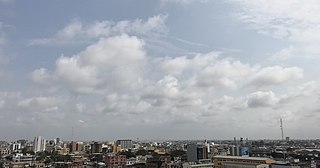
Cotonou is a city in Benin. Its official population count was 679,012 inhabitants in 2012; however, over two million people live in the larger urban area.
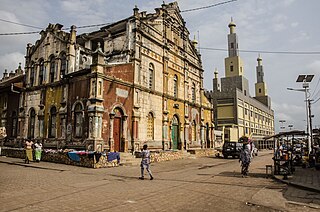
Porto-Novo, also known as Hogbonu and Ajashe, is the capital of Benin. The commune covers an area of 110 square kilometres (42 sq mi) and as of 2002 had a population of 223,552 people.

The demographics of Benin include population density, ethnicity, education level, health of the populace, economic status, religious affiliations and other aspects of the population.
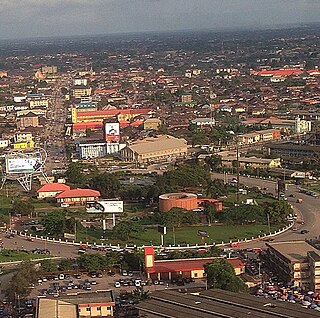
Benin City is the capital and largest city of Edo State, Nigeria. It is the fourth-largest city in Nigeria according to the 2006 census, after Lagos, Kano, and Ibadan, with a population estimate of about 3,500,000 as of 2022. It is situated approximately 40 kilometres (25 mi) north of the Benin River and 320 kilometres (200 mi) by road east of Lagos. Benin City is the centre of Nigeria's rubber industry, and oil production is also a significant industry.
The Benin Expedition of 1897 was a punitive expedition by a British force of 1,200 men under Sir Harry Rawson in response to the ambush of a previous British party under Acting Consul General James Phillips, of the Niger Coast Protectorate. Rawson's troops captured and sacked Benin City, bringing to an end the Kingdom of Benin, which was eventually absorbed into colonial Nigeria.
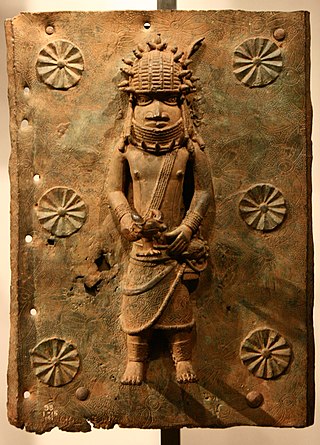
The Benin Bronzes are a group of several thousand metal plaques and sculptures that decorated the royal palace of the Kingdom of Benin, in what is now Edo State, Nigeria. Collectively, the objects form the best examples of Benin art and were created from the thirteenth century by artists of the Edo people. Apart from the plaques, other sculptures in brass or bronze include portrait heads, jewelry, and smaller pieces.

The Benin national football team, nicknamed Les Guépards , represent Benin in men's international association football and are controlled by the Benin Football Federation. They were known as Dahomey until 1975, when the Republic of Dahomey became Benin.

Edo, commonly known as Edo State, is a state located in the South-South geopolitical zone of Nigeria. As of 2006 National population census, the state was ranked as the 24th populated state (3,233,366) in Nigeria, However there was controversy over the population census figures, for example this same state that was ranked 24, population wise in 2006, was number 16 in terms of voters registration in the country in 2019, That shows strongly that the census conducted in 2006 is not a testament of reality on ground. The state population figures is expected to be about 8,000,000 in 2022. Edo State is the 22nd largest State by landmass in Nigeria. The state's capital and city, Benin City, is the fourth largest city in Nigeria, and the centre of the country's rubber industry. Created in 1991 from the former Bendel State, is also known as the heart beat of the nation. Edo State borders Kogi State to the northeast, Anambra State to the east, Delta State to the southeast and southsouth and Ondo State to the west.

The Benin Football Federation is the governing body of association football in Benin. It was founded in 1960, affiliated to CAF in 1963 and to FIFA in 1964. It organizes the national football leagues, including the Benin Premier League, and the national team.

The People's Republic of Benin was a socialist state located in the Gulf of Guinea on the African continent, which would become present-day Benin. The People's Republic was established on 30 November 1975, after the 1972 coup d'état in the Republic of Dahomey. It effectively lasted until 1 March 1990, with the adoption of a new constitution, and the abolition of Marxism–Leninism in the nation in 1989.

Lesbian, gay, bisexual, and transgender (LGBT) persons in Benin face legal challenges not experienced by non-LGBT residents. Although same-sex sexual acts for both men and women are legal in Benin, homosexuals continue to face widespread persecution and are rarely open about their sexuality. They are also considered by many as deviants to the society, and homosexuality is often called a disease brought by the Whites to the country.

Benin and the United States have had an excellent history of relations in the years since Benin embraced democracy. The U.S. Government continues to assist Benin with the improvement of living standards that are key to the ultimate success of Benin's experiment with democratic government and economic liberalization, and are consistent with U.S. values and national interest in reducing poverty and promoting growth. The bulk of the U.S. effort in support of consolidating democracy in Benin is focused on long-term human resource development through U.S. Agency for International Development (USAID) programs.
Sir Abel Guobadia OFR was an educator, administrator, diplomat and retired public servant.
Benin is a coastal country located in the Gulf of Guinea in Western Africa, which is a resource rich region. Energy in Benin has a diverse energy mix and takes several forms including: solar, wind, hydropower, biomass, fossil resources, and mineral resources. Out of this energy mix, about 60% of energy comes from biomass. Benin is also dependent on energy imports from Ghana and Côte d'Ivoire. While power plants and other energy facilities were built in the 1950s and 1960s, the lack of investment has led to deterioration over time. Similarly, its location in the Gulf of Guinea has led to an attempt of oil production starting in the late 1980s. However, due to unprofitable operations, oil production halted in 1998.
Benin faces a number of population health challenges. Apart from modern medicine, traditional medicine plays a big role too.
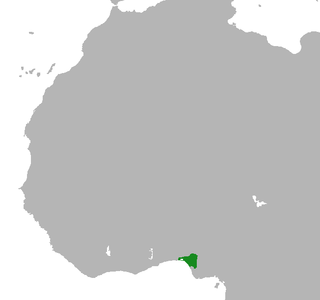
The Kingdom of Benin, also known as the Edo Kingdom, or the Benin Empire was a kingdom within what is now southern Nigeria. It has no historical relation to the modern republic of Benin, which was known as Dahomey from the 17th century until 1975. The Kingdom of Benin's capital was Edo, now known as Benin City in Edo State, Nigeria. The Benin Kingdom was "one of the oldest and most developed states in the coastal hinterland of West Africa". It grew out of the previous Edo Kingdom of Igodomigodo around the 11th century AD, and lasted until it was annexed by the British Empire in 1897.

Patrice Guillaume Athanase Talon is a Beninese politician and businessman who has been President of Benin since 6 April 2016.
The Cinema of Benin refers to the film industry of the Republic of Benin in West Africa.